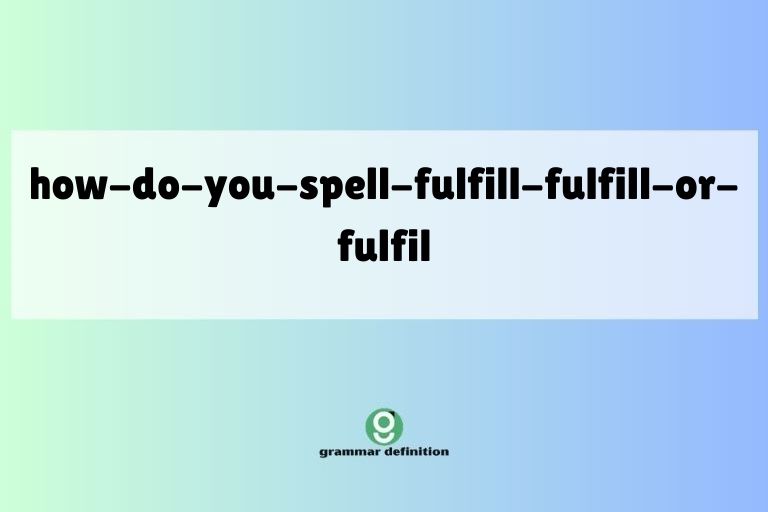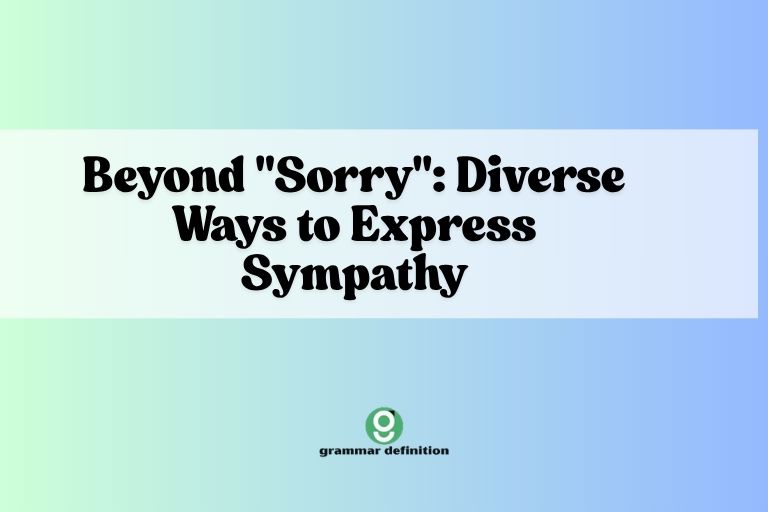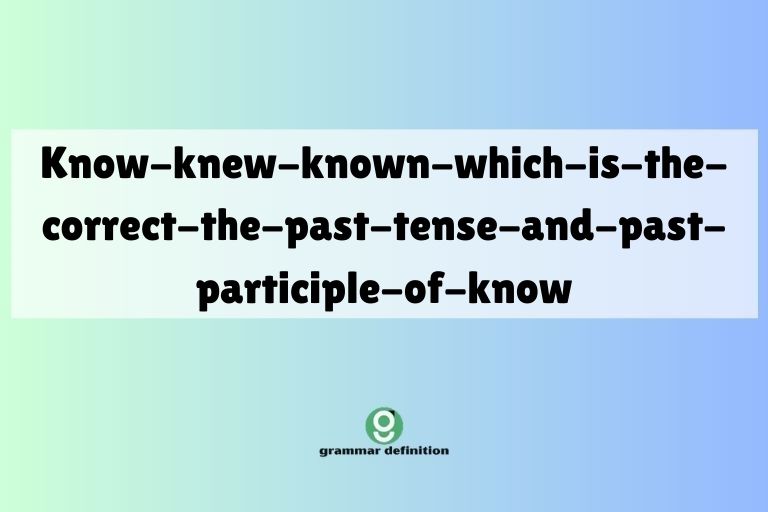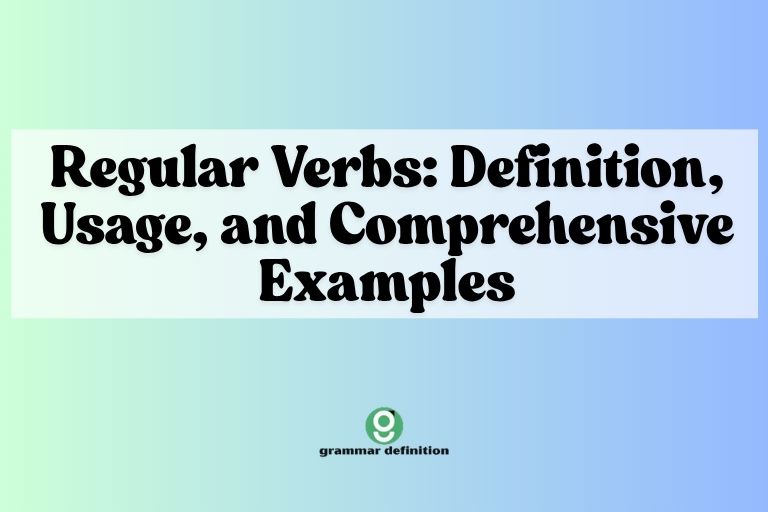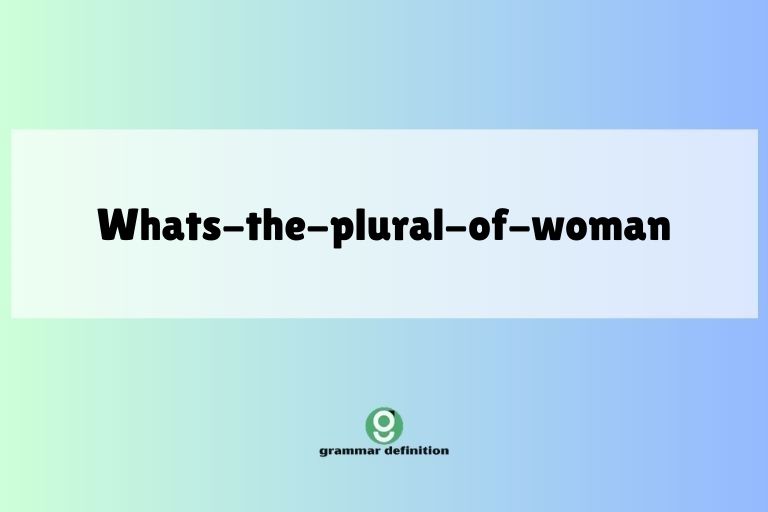Cost or Costed: Understanding the Past Tense of ‘Cost’
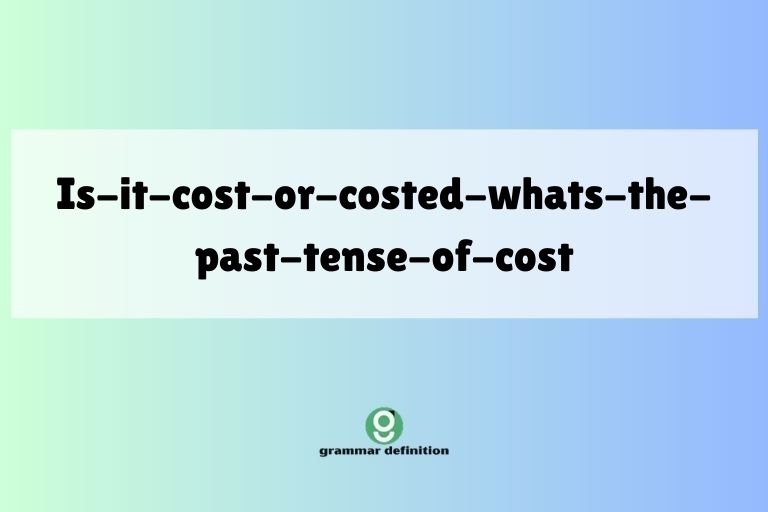
Understanding the correct past tense of irregular verbs like “cost” is crucial for clear and accurate communication in English. Many learners mistakenly use “costed,” but the verb “cost” is irregular and maintains the same form in the past tense.
This article provides a comprehensive guide to mastering the past tense of “cost,” covering definitions, usage rules, examples, common mistakes, practice exercises, and advanced topics. Whether you are a beginner or an advanced learner, this guide will help you confidently use “cost” in various contexts.
Table of Contents
- Introduction
- Definition of ‘Cost’
- Structural Breakdown
- Types or Categories of ‘Cost’ Usage
- Examples of ‘Cost’ in Different Tenses
- Usage Rules for ‘Cost’
- Common Mistakes with ‘Cost’
- Practice Exercises
- Advanced Topics
- FAQ
- Conclusion
Introduction
The verb “cost” is a fundamental part of the English language, used to describe the price or value of something. However, its irregular nature often leads to confusion, especially when forming the past tense.
It’s essential to understand that the past tense of “cost” remains “cost,” not “costed.” This article aims to clarify this point and equip you with the knowledge and practice needed to use “cost” correctly in all its forms. Mastering this simple yet crucial aspect of English grammar will significantly improve your writing and speaking skills.
This guide is designed for English learners of all levels. Whether you’re just starting to learn English or you’re looking to refine your grammar skills, you’ll find valuable information and practical exercises here.
We’ll break down the rules, provide numerous examples, and address common mistakes to ensure you have a solid understanding of how to use “cost” correctly.
Definition of ‘Cost’
The word “cost” can function as both a noun and a verb, each with distinct meanings but related to the idea of value or expenditure.
Cost as a Noun
As a noun, “cost” refers to the amount of money, time, effort, or other resources required to obtain something. It represents the sacrifice or expense incurred in achieving a particular outcome or acquiring a specific item.
Cost as a Verb
As a verb, “cost” means to require the payment of (a specified sum of money) before something can be acquired or done. It describes the action of something having a particular price or requiring a certain amount of resources.
Structural Breakdown
Understanding the structural use of “cost” involves recognizing its irregular verb conjugation and its placement within sentences.
Present Tense
In the present tense, “cost” remains “cost” for all subjects except the third-person singular (he, she, it), where it becomes “costs.”
Example: I cost, you cost, he/she/it costs, we cost, they cost.
Past Tense
The past tense of “cost” is cost. This is the most crucial point to remember. It does not become “costed.”
Example: I cost, you cost, he/she/it cost, we cost, they cost.
Past Participle
The past participle of “cost” is also cost. It is used in perfect tenses (e.g., has cost, had cost) and in passive voice constructions.
Example: It has cost a lot of money.
Present Participle
The present participle of “cost” is “costing.” It is used in continuous tenses (e.g., is costing, was costing).
Example: The project is costing more than we anticipated.
Types or Categories of ‘Cost’ Usage
The word “cost” can be used in various contexts, each with slightly different nuances. Here are some common categories:
Financial Cost
This refers to the monetary value of something. It’s the most common usage of “cost.”
Emotional Cost
This describes the emotional toll or burden associated with a particular action or situation.
Opportunity Cost
This refers to the value of the next best alternative that is foregone when making a decision.
Time Cost
This refers to the amount of time required to complete a task or achieve a goal.
Examples of ‘Cost’ in Different Tenses
To solidify your understanding, let’s look at numerous examples of “cost” used in different tenses and contexts.
Present Tense Examples
The following table provides examples of “cost” in the present tense, showing its usage with different subjects.
| Subject | Example Sentence |
|---|---|
| I | I cost the company a lot of money in mistakes last year. |
| You | You cost too much to maintain. |
| He | He costs the team more points than he scores. |
| She | She costs the company thousands in late fees. |
| It | It costs a lot to live in New York City. |
| We | We cost our parents a lot of worry when we were young. |
| They | They cost the project a lot of time due to their delays. |
| The car | The car costs $30,000. |
| The tickets | The tickets cost $50 each. |
| Living here | Living here costs a fortune. |
| This phone | This phone costs more than my rent. |
| These shoes | These shoes cost a lot of money. |
| My education | My education costs a significant amount. |
| Your help | Your help costs me nothing but time. |
| Their vacation | Their vacation costs them about $5000. |
| The software | The software costs $99 per month. |
| This service | This service costs extra. |
| The repair | The repair costs less than a new one. |
| The insurance | The insurance costs $100 per month. |
| The membership | The membership costs $200 annually. |
| I | I cost my family a lot of heartache. |
| You | You cost me sleep with your late-night calls. |
| He | He costs his team morale with his negativity. |
| She | She costs her reputation with her actions. |
| It | It costs the environment a lot to produce. |
| We | We cost our company valuable partnerships with our mistakes. |
| They | They cost their community trust with their lies. |
Past Tense Examples
The following table illustrates the correct usage of “cost” in the past tense. Remember, the form remains the same as the base form.
| Subject | Example Sentence |
|---|---|
| I | I cost a lot of money on that vacation last year. |
| You | You cost me a lot of time trying to fix your mistakes. |
| He | He cost the team the game with that penalty. |
| She | She cost the company a client by being rude. |
| It | It cost a lot more than I expected to repair the car. |
| We | We cost ourselves the opportunity by being late. |
| They | They cost the project valuable time due to their delays. |
| The car | The car cost $25,000 when I bought it. |
| The tickets | The tickets cost $40 last year. |
| Living there | Living there cost a fortune back then. |
| This phone | This phone cost less when it first came out. |
| These shoes | These shoes cost a lot less on sale. |
| My education | My education cost a significant amount back in the day. |
| Your help | Your help cost me nothing but gratitude. |
| Their vacation | Their vacation cost them a lot less last year. |
| The software | The software cost $79 per month when they started. |
| This service | This service cost extra last time. |
| The repair | The repair cost more than I wanted to pay. |
| The insurance | The insurance cost $80 per month last year. |
| The membership | The membership cost $150 annually when it started. |
| I | I cost my family a lot of heartache back then. |
| You | You cost me sleep with your late-night worries. |
| He | He cost his team morale with his constant complaining. |
| She | She cost her reputation with that one mistake. |
| It | It cost the environment a lot to produce those products. |
| We | We cost our company valuable partnerships by missing deadlines. |
| They | They cost their community trust with their deceitful actions. |
Past Participle Examples
The past participle “cost” is used in perfect tenses and passive voice constructions. Here are some examples:
| Tense/Construction | Example Sentence |
|---|---|
| Present Perfect | It has cost a fortune to renovate this house. |
| Past Perfect | The project had cost more than we initially estimated. |
| Future Perfect | By the time we finish, this venture will have cost us everything. |
| Passive Voice | A lot of money has been cost on this endeavor. |
| Present Perfect Continuous | The delays have been costing us time and money. |
| Past Perfect Continuous | The constant errors had been costing the company its reputation. |
| Future Perfect Continuous | By the end of the year, this mismanagement will have been costing us millions. |
| Present Perfect | This decision has cost me a lot of sleep. |
| Past Perfect | That mistake had cost him his job. |
| Future Perfect | This delay will have cost us the contract. |
| Passive Voice | A great deal of effort has been cost on this project. |
| Present Perfect Continuous | The constant arguments have been costing them their friendship. |
| Past Perfect Continuous | The lack of planning had been costing the team valuable time. |
| Future Perfect Continuous | The ongoing repairs will have been costing us a small fortune by the time they’re done. |
| Present Perfect | His recklessness has cost the company dearly. |
| Past Perfect | The unexpected repairs had cost them their entire savings. |
| Future Perfect | The lawsuit will have cost him everything he owns. |
| Passive Voice | A heavy price has been cost due to their negligence. |
| Present Perfect Continuous | The increasing regulations have been costing businesses a lot of money. |
| Past Perfect Continuous | The frequent breakdowns had been costing the project significant delays. |
| Future Perfect Continuous | The continuous renovations will have been costing the city millions by the end of the decade. |
Present Participle Examples
The present participle “costing” is used in continuous tenses to describe an ongoing action.
| Tense | Example Sentence |
|---|---|
| Present Continuous | The project is costing more than we budgeted. |
| Past Continuous | The repairs were costing a fortune. |
| Future Continuous | The ongoing maintenance will be costing us a lot of money. |
| Present Continuous | This mistake is costing us valuable time. |
| Past Continuous | The delays were costing the company its reputation. |
| Future Continuous | The constant errors will be costing us clients. |
| Present Continuous | The new regulations are costing businesses a lot of money. |
| Past Continuous | The lawsuit was costing him his peace of mind. |
| Future Continuous | The constant breakdowns will be costing the company production time. |
| Present Continuous | The rising inflation is costing everyone more to live. |
| Past Continuous | The renovations were costing the city millions. |
| Future Continuous | The ongoing repairs will be costing the homeowner a small fortune. |
| Present Continuous | The new policies are costing employees their benefits. |
| Past Continuous | The storm was costing the town its infrastructure. |
| Future Continuous | The constant upgrades will be costing customers more money. |
| Present Continuous | The increased security measures are costing travelers time and convenience. |
| Past Continuous | The economic downturn was costing many people their jobs. |
| Future Continuous | The ongoing conflict will be costing the region stability. |
| Present Continuous | The constant changes are costing the team productivity. |
| Past Continuous | The project was costing more resources than anticipated. |
| Future Continuous | The ongoing research will be costing the university millions. |
Usage Rules for ‘Cost’
The primary rule to remember is that the past tense and past participle of “cost” is “cost,” not “costed.” Here are some additional usage rules:
- Use “cost” to indicate the price or value of something in the present, past, and future.
- Use “costing” in continuous tenses to describe an ongoing process of incurring expenses or requiring resources.
- Be mindful of subject-verb agreement in the present tense (he/she/it costs).
There are no significant exceptions to these rules. The key is to remember the irregular nature of the verb “cost” and avoid the common mistake of using “costed.”
Common Mistakes with ‘Cost’
The most common mistake is using “costed” as the past tense of “cost.” Let’s look at some examples of correct and incorrect usage:
| Incorrect | Correct |
|---|---|
| The book costed $20 yesterday. | The book cost $20 yesterday. |
| It has costed me a lot of time. | It has cost me a lot of time. |
| The repairs costed more than I expected. | The repairs cost more than I expected. |
| The project has costed us dearly. | The project has cost us dearly. |
| Living in the city costed a fortune. | Living in the city cost a fortune. |
| His mistake costed the team the game. | His mistake cost the team the game. |
| The damages costed a lot to repair. | The damages cost a lot to repair. |
| The vacation costed us our savings. | The vacation cost us our savings. |
| The lawsuit has costed him everything. | The lawsuit has cost him everything. |
| That decision costed me a lot of sleep. | That decision cost me a lot of sleep. |
Practice Exercises
Test your understanding with these practice exercises. Choose the correct form of “cost” to complete each sentence.
Exercise 1: Fill in the Blanks
| Question | Answer |
|---|---|
| 1. The tickets ______ $50 each. | cost |
| 2. The project ______ more than we anticipated. | cost |
| 3. Living in New York ______ a fortune. | costs |
| 4. The car ______ $30,000 when I bought it. | cost |
| 5. It has ______ a lot of money to renovate the house. | cost |
| 6. The new software ______ $99 per month. | costs |
| 7. The repairs ______ more than I expected. | cost |
| 8. The vacation ______ us our entire savings. | cost |
| 9. The delay ______ the company a valuable client. | cost |
| 10. The mistake is ______ us valuable time. | costing |
Exercise 2: Correct the Sentences
Correct the following sentences that contain errors in the use of “cost.”
| Question | Answer |
|---|---|
| 1. The book costed $20 yesterday. | The book cost $20 yesterday. |
| 2. It has costed me a lot of time. | It has cost me a lot of time. |
| 3. The repairs costed more than I expected. | The repairs cost more than I expected. |
| 4. The project has costed us dearly. | The project has cost us dearly. |
| 5. Living in the city costed a fortune. | Living in the city cost a fortune. |
| 6. His mistake costed the team the game. | His mistake cost the team the game. |
| 7. The damages costed a lot to repair. | The damages cost a lot to repair. |
| 8. The vacation costed us our savings. | The vacation cost us our savings. |
| 9. The lawsuit has costed him everything. | The lawsuit has cost him everything. |
| 10. That decision costed me a lot of sleep. | That decision cost me a lot of sleep. |
Exercise 3: Sentence Completion
Complete the following sentences using the correct form of “cost” in the appropriate tense.
| Question | Answer |
|---|---|
| 1. The new equipment ______ (cost) a significant amount of money. | costs |
| 2. The damages from the storm ______ (cost) the city millions of dollars last year. | cost |
| 3. The ongoing delays are ______ (cost) the company valuable contracts. | costing |
| 4. By the time we finish, this project will have ______ (cost) us a fortune. | cost |
| 5. The increased security measures are ______ (cost) travelers time and convenience. | costing |
| 6. The economic downturn ______ (cost) many people their jobs. | cost |
| 7. The constant changes are ______ (cost) the team productivity. | costing |
| 8. The project ______ (cost) more resources than anticipated. | cost |
| 9. The ongoing research will be ______ (cost) the university millions. | costing |
| 10. This new car ______ (cost) me an arm and a leg. | cost |
Advanced Topics
For advanced learners, consider these more nuanced aspects of “cost”:
- Figurative Language: “Cost” can be used metaphorically to describe non-monetary sacrifices or consequences (e.g., “His ambition cost him his friends”).
- Phrasal Verbs: Explore phrasal verbs that include “cost,” such as “cost out” (to calculate the cost of something).
- Cost-Benefit Analysis: Understand how “cost” is used in the context of cost-benefit analysis, a decision-making process that weighs the costs and benefits of different options.
FAQ
Here are some frequently asked questions about the verb “cost”:
- Is “costed” ever a correct word?
No, “costed” is not a standard or accepted form of the verb “cost” in any context. The past tense and past participle of “cost” are always “cost.” Avoid using “costed” in your writing and speech.
- How do I remember that the past tense of “cost” is “cost”?
Think of other irregular verbs that follow a similar pattern, such as “cut,” “hit,” and “hurt,” where the past tense is the same as the base form. Associating “cost” with these verbs can help you remember its irregular conjugation.
- Can “cost” be used in the passive voice?
Yes, “cost” can be used in the passive voice. For example, “A lot of money has been cost on this project.” However, passive constructions with “cost” are less common than active voice constructions.
- What is the difference between “cost” and “price”?
“Cost” refers to the amount of money, time, or effort required to produce or obtain something. “Price” refers to the amount of money that something is sold for. The cost is what the seller incurs, while the price is what the buyer pays.
- How do I use “cost” in continuous tenses?
Use the present participle “costing” in continuous tenses to describe an ongoing process of incurring expenses or requiring resources. For example, “The project is costing more than we budgeted.”
- Can “cost” be used with abstract concepts?
Yes, “cost” can be used with abstract concepts to describe the sacrifices or consequences associated with them. For example, “His ambition cost him his friends,” or “The decision cost her a lot of sleep.”
- What are some common collocations with “cost”?
Common collocations with “cost” include “at all costs,” “cost of living,” “cost-effective,” “opportunity cost,” and “fixed costs.” These phrases are frequently used in both spoken and written English.
- Is it ever correct to use “cost” as a noun?
Yes, “cost” can be used as a noun to refer to the amount of money, time, or effort required to obtain something. For example, “The cost of the project was higher than expected,” or “What is the cost of this item?”
Conclusion
Mastering the correct usage of “cost” is essential for clear and accurate communication in English. Remember that the past tense and past participle of “cost” is always “cost,” not “costed.” By understanding the rules, reviewing the examples, and practicing the exercises in this article, you can confidently use “cost” in various contexts.
Continue to practice and pay attention to how native speakers use “cost” in their speech and writing. With consistent effort, you’ll avoid common mistakes and improve your overall English proficiency.
Remember, language learning is a journey, and every step you take brings you closer to fluency. Keep practicing, and you’ll master even the trickiest aspects of English grammar!


